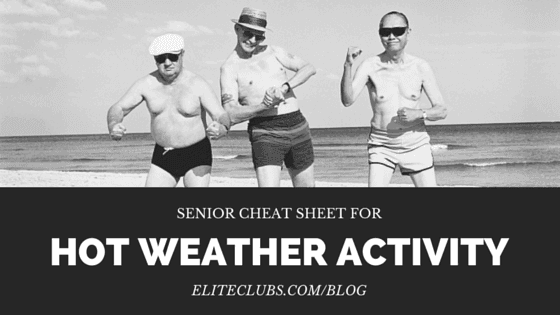
It’s summertime in Wisconsin, and as the weather starts to warm up, thoughts start to turn to being active outside. We’ve spent the last couple of months sitting in the house watching the snow melt and the rain turn everything green, and now we want to enjoy the warmth of the sun! We go for walks, ride bicycles, work in the garden, play tennis, and exercise. But, as nice as it is to feel the warmth of summer and spend our time outside, it’s important to remember that being active in the summer heat carries a new set of challenges.
When active outside in the warm, sometimes hot and humid weather; seniors need to really pay attention to how your body is feeling. Heat exhaustion, heat stroke, and dehydration are all serious concerns that seniors need to take steps to avoid, so I am going to give you a couple of tips to help you prepare for your active, outdoor lifestyle this summer season.
Know if you are at an increased risk
Seniors and individuals with medical issues may already be at an increased risk. So if you:
- have heart or lung disease
- have inefficient sweat glands
- notice changes in the skin due to normal aging
- are on medications that can cause an inability to perspire such as diuretics, certain heart or blood pressure drugs, sedatives or tranquilizers
- have poor circulation
- are substantially overweight or underweight
You need to pay extra attention to how you are feeling and take extra precautions.
Avoid the hottest time of the day
The simplest way to help avoid the dangers of heat exhaustion, heat stroke, and dehydration is to simply plan your activity during the morning or evening when it won’t be quite as hot.
Drink plenty of water
When we are active, we sweat. Sweating is our body’s way of cooling down. When our body temperature rises, due to activity or heat, our body releases water in the system to get it on the surface of the skin. It’s by the water on the surface of our skin getting in contact with the outside air and evaporating that we cool down.
It is important that seniors replenish this water throughout the activity, as well as afterward. The best way to determine if you are drinking enough water is through the color of your urine. A light, lemonade color is ideal. The closer the color is to apple juice, the more dehydrated you are and the more you’ll run the risk of a potential health issue.
Wear lightweight, light colored clothes
Wear clothes that breathe and allow airflow to get to the skin to aid in cooling down. Lightweight cotton clothes are ideal because they won’t trap the heat inside. Also, seniors should wear clothes that are lighter in color that will reflect the sun. Darker clothes will absorb the sun and heat up quicker, increasing your core body temperature.
Avoid exercising in extreme heat and humidity
This may go without saying, but being active in extreme heat and humidity is extremely dangerous for seniors. When the humidity is high, the air becomes saturated with moisture. As a result, when you sweat, the moisture on your skin won’t be able to evaporate, so you won’t be able to cool down nearly as fast. When we can’t cool down, our heart rate and blood pressure will increase because the body is going to work harder to try to cool down. So on these days, it’s better to find activities that you can do inside. Joining your local tennis club or gym and scheduling time on the indoor courts or working out in the fitness center is a great alternative on these extremely hot and humid days, or simply going to the mall and walking inside are just a few ideas to help keep you active.
Listen to your body
With everything that you do, it’s important to listen to your body and know when it is time to stop. If you are new to getting active, it’s always best to consult with your physician first and then contact a personal trainer to help you get started. However, if you are on your own and you start to feel light-headed, dizzy, nauseous, confused, or cold, these are all major warning signs that something is not right and that you need to stop what you are doing immediately and call 9-1-1, don’t wait and hope that it will pass or try to finish what you are doing.
By using these tips, seniors will be able to be safe, active, and enjoy all that this summer has to offer.
Set up a Free Fitness ConsultationWritten by Luke Lewitzke, CPT; Personal Training Director at Elite Sports Club-Mequon